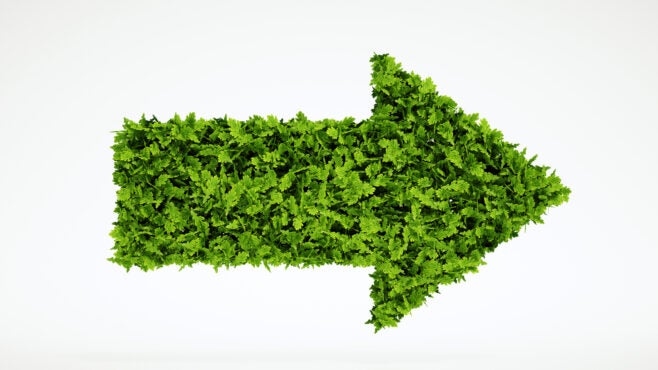

Companies across Europe made a big push to issue green, social and sustainable debt last year. (Image by Petmal, via IStock)
- There was $497.7bn issuance from 1,099 issues of green, social and sustainability (GSS) debt globally last year, based on Capital Monitor figures.
- Europe dominates the table with $308.2bn issuance and an average GSS bond sale in Europe of $567.6m in 2021.
- BNP Paribas, Crédit Agricole and JP Morgan Chase are the most active underwriters of GSS debt.
The volume of green, social and sustainability (GSS) debt issuance continues to grow. Last year saw $497.7bn issuance from 1,099 issues, according to Capital Monitor analysis, only a fraction below the $500bn issuance famously predicted by Christopher Flensborg, head of climate and sustainable finance at Swedish financial group SEB, in December 2020. This was up from the $397bn from 1,005 issues in 2020.
Poring through data compiled by sister company Global Data, European companies delivered the most green, social and sustainability (GSS) debt issuance in 2021, with the number of bonds issued only slightly lower than the rest of the world combined.
Europe issued 543 GSS bonds, followed by Asia-Pacific at 335 and North America at 165. South and Central America and the Middle East came in a long way behind with 35 and 21 deals, respectively.
Bond volumes suggest that not only did European companies issue more bonds, they were also larger in size. Europe raised $308.2bn, with Asia-Pacific on $87.9bn and North America on $70.1bn. The average GSS bond sale in Europe last year was for $567.6m and those in North America were $424.2m, while those in Asia-Pacific came in at less than half of Europe's at $262.4m.
Last year was a distinct step in issuance for all parts of the world over 2020, with the exception of North America. European companies continued to issue the most GSS bonds (year-on-year) with 453, and raising a total of $242.3bn. Asia-Pacific companies raised $49.5bn from 254 issues, while North American firms raised $79.8bn from 249 issues.
Environment tops use of GSS proceeds
It is perhaps not a major surprise to see that environmental key performance indicators (KPI) have dominated issuance over the past few years. Even discounting the peak of 33 bond issues with environmental targets in September 2020 – the overwhelmingly highest month of issuance since January 2019 – the whole of last year saw 87 environmentally targeted bonds versus 14 with combined environmental and social targets and four with social targets.
The four with social targets included the €14bn ($14.5bn) two-tranche seven-year and 30-year bond from the European Commission at the end of January last year. Funds raised have been lent to member states to cover the costs of funding Covid-19 pandemic measures.
Also included was the €750m 0.75% ten-year bond from La Banque Postale in June with the proceeds used to finance its portfolio of affordable housing assets as well as hospitals and care homes.
Green Sweden
Looking at the European market, the greatest volume of GSS bonds last year came from Germany, at 119 issues. This compares with 76 in 2020 and 26 in 2019.
Swedish companies are also regularly issuing GSS debt, with last year seeing 109 issues, up from 101 in 2020 and 95 in 2019.
The tradition of green issuance from Sweden is so strong that it makes up 5% of the global total, even while the country represents just 0.3% of the global population and economy, according to the non-profit organisation the Climate Bonds Initiative.
“Sweden is proof that it’s possible to transition to a more sustainable economy and continue to create jobs if governments do it in a responsible way,” Åsa Lindhagen, the country’s financial markets minister, told Capital Monitor in October last year.
Behind Sweden sits France and the UK. The former was in second place – behind Sweden – in 2019 with 47 issues, though it has declined for the past two years, with 40 bonds in 2020 and 39 bonds in 2021. The UK saw a dramatic leap forward last year with 55 GSS bonds, up from 38 the previous year and 32 in 2019.
In terms of issuance volume, however, the UK comes out on top. It sold $53.5bn worth of GSS bonds last year, notably above Germany on $47.5bn and France on $43.2bn.
Sweden’s volume of issuance languished rather at $10.1bn.
Most active GSS underwriters
The most active underwriters of GSS debt in Europe are BNP Paribas, Crédit Agricole and JP Morgan Chase. Over the past three years, BNP Paribas has worked on 157 deals, while Crédit Agricole has managed 146 deals, slightly ahead of JP Morgan at 141 deals, according to Global Data.
Although BNP Paribas was the most active in 2019 and 2020, underwriting 53 and 60 bonds, respectively, in 2021 JP Morgan and Crédit Agricole led the way with 73 and 58 bonds, respectively, compared with and BNP Paribas's 44.
Innovative green deals of the past couple of years had these banks on the ticket, such as the €500m ($564.7m) loan and private placement for French builder NGE, a £300m ($411.1m) five-year sustainability bond for British fashion house Burberry, and a €1.45bn dual-tranche sustainability-linked term loan for Ramsay Santé, Europe’s second-largest private healthcare provider.
The same dynamic can be seen in the volume of deals. Although BNP had $32.1bn and $66.4bn in 2019 and 2020, it was again outstripped in its $58.4bn last year by JP Morgan and Crédit Agricole, which had $83.5bn and $66.9bn, respectively.
The difference between volume and value
Three third-party opinion providers dominated the GSS bond landscape last year: Cicero – which provided its first second opinion for the World Bank’s first green bond framework in 2008 – Morningstar’s Sustainalytics and ISS ESG, which is majority-owned by Deutsche Börse.
Third-party opinion providers are the asset class’s gatekeepers. They provide an assessment of the accuracy and integrity of a bond, loan or indeed sustainability framework and very often report, usually on an annual basis, throughout the life of a bond or loan on how its sustainability goals are progressing.
Over the past three years, Cicero has rated 414 bonds, Sustainalytics has rated 285 bonds and ISS ESG has rated 222.
Although Moody’s-owned Vigeo Eiris has rated far fewer bonds – 113 over the past three years, and last year almost a third of the number of bonds that Cicero did in Europe – it joins Sustainalytics at the top of the ranking table for the volume of GSS bonds it has rated in terms of value.
Last year, Sustainalytics rated $85.1bn green bonds in Europe while Vigeo Eiris rated $70.7m. ISS ESG and Cicero came in third and fourth places with $53.1m and $27.3m, respectively.






